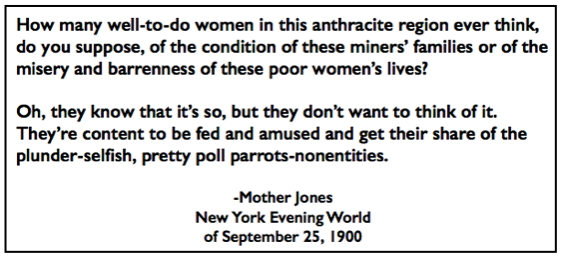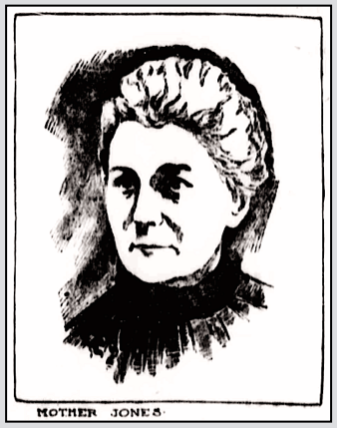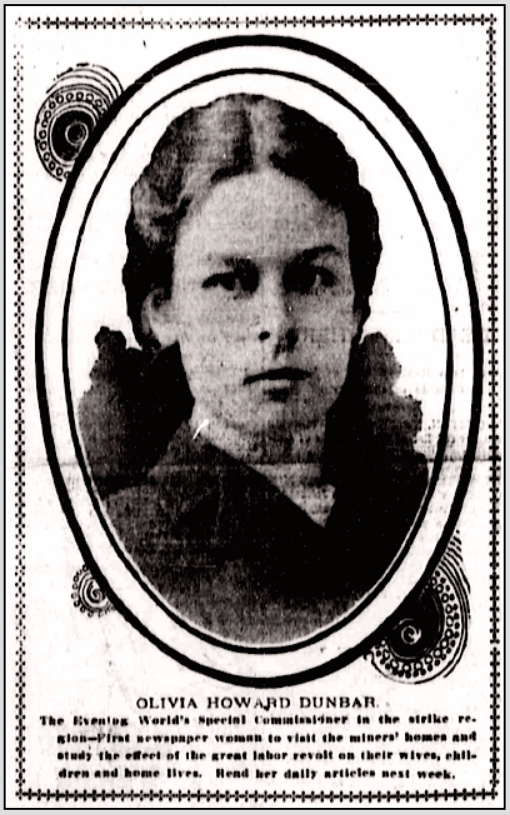 ———-
———-
Hellraisers Journal – Tuesday October 9, 1900
Mahanoy City, Pennsylvania – Mother Jones Interviewed by Olivia Howard Dunbar
From the New York Evening World of September 25, 1900:
EVENING WORLD WOMAN INTERVIEWS
“MOTHER JONES.”
—————Strikers Friend Tells Some Plain Truths About the
Great Struggle Between the Miners and Operators.
——-NO. IX. OF THE SERIES.
BY OLIVIA HOWARD DUNBAR.MOTHER JONES, THE STRIKERS’ FRIEND
(Special to The Evening World.)
MAHANOY CITY, Pa., Sept. 25.-“Please tell all the readers of The Evening World for me that we have succeeded in crippling the operators, that the situation is most encouraging, and that we expect an early victory.”
This was the message that “Mother” Jones intrusted to me to-day, and she smiled hopefully as she said it.
Ceaselessly vigilant, she had come to Mahanoy City to dull any possible echo of the carnival of strife and slaughter that has resounded so menacingly through Shenandoah.The situation was tense when she arrived, but there had been no outbreak. Outwardly the little city was unruffled. Early in the morning I had found a group of swarthy, eager-eyed Hungarian women applauding an effigy of a non-union workman that had been bound to an electric-light pole on Eighth street.
Their voices were shrill, their gestures violent. The suggestive spectacle had aroused all their fury against the class that they consider selfishly retards the movement that means life or death to them.
MOTHER JONES WON THEM.
The men, however, had remained passive. And Mother Jones found the audience that gathered about her as gentle and tractable as a kindergarten class. It was composed mainly of foreigners, and the face of the Hungarian, Polish or Lithuanian peasant, born to a slave’s heritage, transplanted to conditions too baffling and contradictory for his brain to grasp, is not sensitive or responsive.
Yet their half-sullen, half-bewildered look vanished as they listened to the slim, white-haired little woman’s familiar phrasing of familiar principles, and they were all aglow with enthusiasm when she had finished.
All that is remarkable about Mother Jones’s oratory is the results that she accomplishes with it. Her skill in reaching the understanding and the emotions of men and women who do not know her language is great enough perhaps to explain the fury directed against her by the class that is opposed to the strike.
I talked with her afterward, and found not so much a woman absorbed in an idea as an idea embodied in a woman.
There is something singularly impersonal in the speech and manner of this delicately pretty, fanatical earnest old lady. Mother Jones has no other thought than of the miners’ emancipation. What she cannot forgive in other women is that they have no thought of it at all.
[She lamented, tolerantly:]
But women are slow to understand reforms. They have no perception of the changes in economic conditions. They are blind to all but personal concerns. That is why I stand alone in this work.
FIELD FOR RICH WOMEN.
How many well-to-do women in this anthracite region ever think, do you suppose, of the condition of these miners’ families or of the misery and barrenness of these poor women’s lives?
Oh, they know that it’s so, but they don’t want to think of it. They’re content to be fed and amused and get their share of the plunder-selfish, pretty poll parrots-nonentities!
The gently little lady became the agitator and her mild blue eyes flashed fire.
[She went on:]
And it’s so easy to appeal to and influence these people. They’re always so gentle with me, even the wildest of them. Do you suppose any cur of a Sheriff’s deputy or twenty of them, for that matter, could quiet them as I can?
Oh, I love them and understand them and they trust me. That’s the secret of it. It isn’t necessary to speak their language or to point a pistol at them if you have a heart that can sympathize!
I asked Mother Jones what use she made of her influence over the women and what advice she gave them at this crisis.
[She laughed:]
Well, I got up at 5 this morning in Hazleton and led fifty of them to close up a colliery. That’s one way I teach them.
MOTHER JONES FORMS UNIONS.
Then I am trying to form in all the towns auxiliaries of the Mine Workers’ Union. That kind of organization develops slowly, but it gives the women confidence.
They have no idea yet what a tremendous factor they are in the labor question. In this way they’ll learn.
Then I talk to them, over and over again, of the emancipation of the mine worker and appeal to them through their children. They are intelligent enough any way, but they will meet you more than half way when you bring the babies into the question, they are such devoted mothers.
Anybody can see what a firm hold of the situation they have now.
Anybody can see how brave they are.-
“And their courage will last?”
Just as long as may be necessary. I know them. It’s they that are going to win the victory for us. And they won’t starve, either, wretched as they are. They’ll find some way to live, because I’ve made them feel that justice is bound to triumph—-
“When?”
Some day, I know it.
Mother Jones is gifted with unconquerable optimism, it will be seen, which lends her a certain buoyancy of spirit. She trips along the street like a schoolgirl, the black bows fluttering on her hat and her white curls dancing.
And when I left her she had been holding a merry court, while the town poet, who is serious and middle-aged, read her an ode addressed to herself and composed of countless vigorous quotations. Mother Jones liked it and was as gracious as the town poet had been adulatory.
WOMEN ANGRY AT DEPUTIES.
The prevailing feeling among the women whom I visited to-day was that of resentment at the calling out of armed men. Sheriff’s deputies are, in fact, being sworn in by the score, a measure which may have been necessary in Shenandoah, but which tends to kindle bitter feeling in towns where violence has not already arisen.
“Who are these sheriff’s deputies?” a group of matrons were fiercely demanding, one of the other. “Insolent cubs who can’t earn a living. Does a hard-working miner like to see them given the authority to shoot him down?”
The calling out of soldiers is considered still further unwarrantable.
Saturday was payday at the local collieries. And it was every where a remarkably self-contained and peaceable line of men that went to draw these last precious earnings. Although every where incomprehensibly patient and plodding, the miners at Mahanoy City seem exceptionally unassertive.
President Richard Northy, of the local union, is justified, apparently, in the pride with which he refers to the character of the men here.
“I doubt if we have violence,” he said to-day, “even if the men starve, and we know that some of them are on the way to it.”
But starvation, as pale, tired Mrs. James McBride reminded me to-day, is not the only thing to fear. Her baby died a month ago.
ALWAYS SICKNESS AROUND.
[She said:]
There’s always sickness around, from those dirty streams you see running right under our windows, and from the houses themselves, too. Heaven knows the best housekeeper in the world couldn’t keep them clean.
Company houses? Why, of course. If we could afford to live in any other kind my baby might still be alive.
It was not far away from this house that I watched a group of children attempt to play “tag.” It was a spiritless performance. The boys trotted soberly about, the little girls made a few impulsive spurts to keep up with them, then one by one wearily dropped out of the game.
Most of them picked up an infant brother or sister to carry about, so strong, even in the youngest, has become the habit of burden-bearing.
There had been no shouts or laughter or any of the excitement of a “game,” and in five minutes it was all over.
Playtime might as well he omitted from the schedule of the children of a mining patch.
OLIVIA HOWARD DUNBAR.
[Emphasis added.]
~~~~~~~~~~~~~~~~~~~~~~
SOURCE & IMAGE
The Evening World
(New York, New York)
-Sept 25, 1900
https://chroniclingamerica.loc.gov/lccn/sn83030193/1900-09-25/ed-1/seq-2/
See also:
Tag: Great Anthracite Strike of 1900
https://weneverforget.org/tag/great-anthracite-strike-of-1900/
“The Anthracite Miners’ Strike of 1900”
Author(s): George O. Virtue
Source: Journal of Political Economy, Vol. 9, No. 1 (Dec., 1900), pp. 1-23
Published by: The University of Chicago Press
https://www.journals.uchicago.edu/doi/pdfplus/10.1086/250711
Series by Olivia Howard Dunbar
-reporting from scene of Great Anthracite Strike of 1900
I. Sept 15-Intro with photo of Dunbar
https://chroniclingamerica.loc.gov/lccn/sn83030193/1900-09-15/ed-1/seq-1/
II. Sept 17-re Mothers Weep
https://chroniclingamerica.loc.gov/lccn/sn83030193/1900-09-17/ed-1/seq-2/
III. Sept 18-re Child Slavery
https://chroniclingamerica.loc.gov/lccn/sn83030193/1900-09-18/ed-1/seq-2/
IV. Sept 19-re Women Warriors
https://chroniclingamerica.loc.gov/lccn/sn83030193/1900-09-19/ed-1/seq-2/
V. Sept 20-re Strike Rations
https://chroniclingamerica.loc.gov/lccn/sn83030193/1900-09-20/ed-1/seq-2/
VI. Sept 21-re Sad Home Life
https://chroniclingamerica.loc.gov/lccn/sn83030193/1900-09-21/ed-1/seq-2/
VII. Sept 22-re Women Leaders
https://chroniclingamerica.loc.gov/lccn/sn83030193/1900-09-22/ed-1/seq-2/
VIII. Sept 24-re Women Close Mines
https://chroniclingamerica.loc.gov/lccn/sn83030193/1900-09-24/ed-1/seq-2/
IX. Sept 25-Interview with Mother Jones
https://chroniclingamerica.loc.gov/lccn/sn83030193/1900-09-25/ed-1/seq-2/
X. Sept 26-Interview with Mine Owner
https://chroniclingamerica.loc.gov/lccn/sn83030193/1900-09-26/ed-1/seq-4/
XI. Sept 27-re John Mitchell
https://chroniclingamerica.loc.gov/lccn/sn83030193/1900-09-27/ed-1/seq-2/
XII. Sept 28-re Little Mothers
https://chroniclingamerica.loc.gov/lccn/sn83030193/1900-09-28/ed-1/seq-2/
XIII. Sept 29-re Mrs. Coxe, Miners’ Angel
https://chroniclingamerica.loc.gov/lccn/sn83030193/1900-09-29/ed-1/seq-2/
~~~~~~~~~~~~~~~~~~~~~~~~~~~~~~~~~~~~~~~~~~~~~
I Am A Union Woman – Deborah Holland
Lyrics by Aunt Molly Jackson


